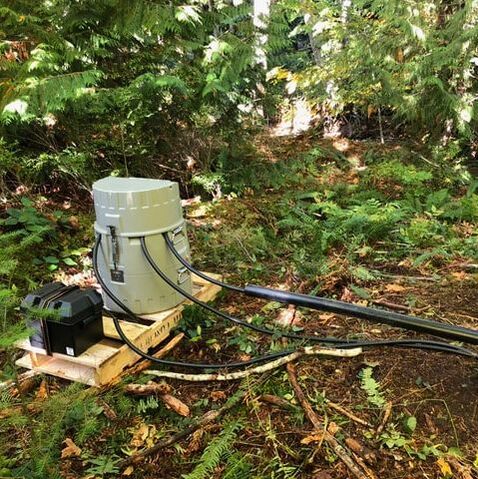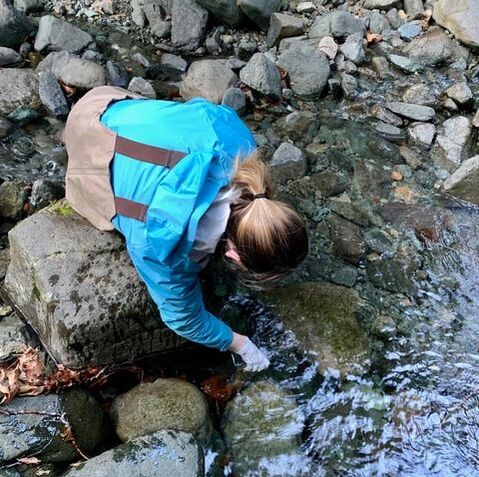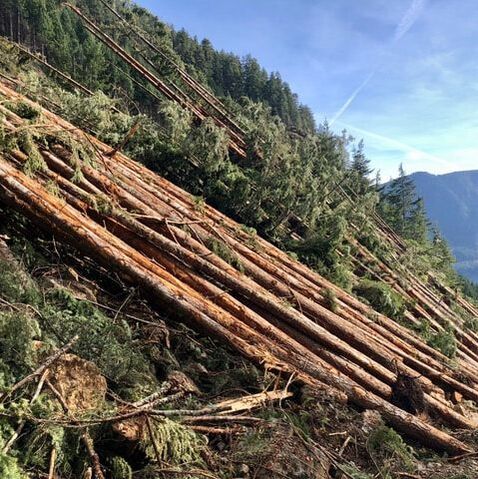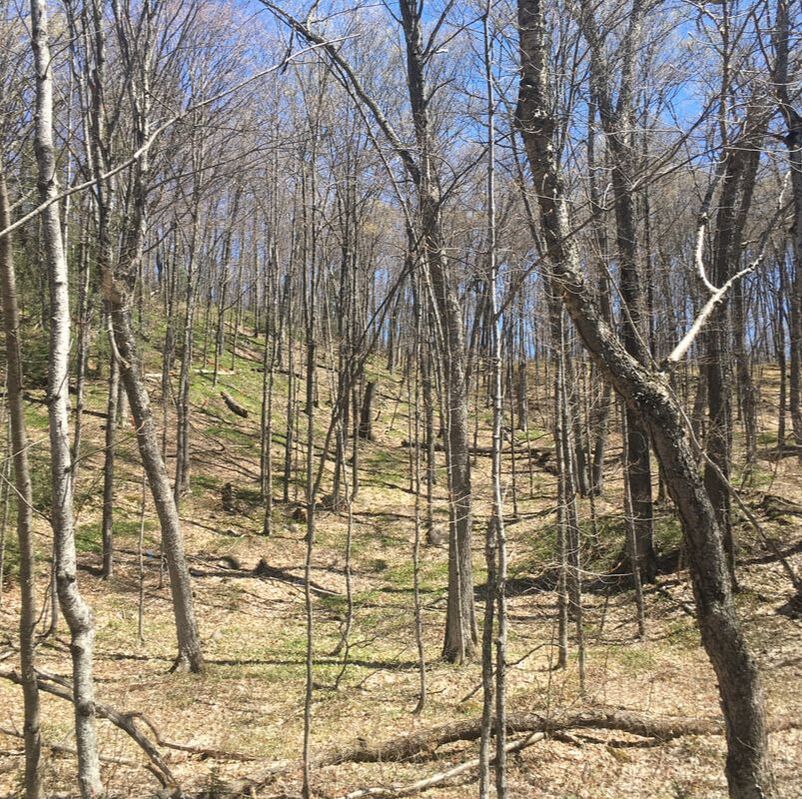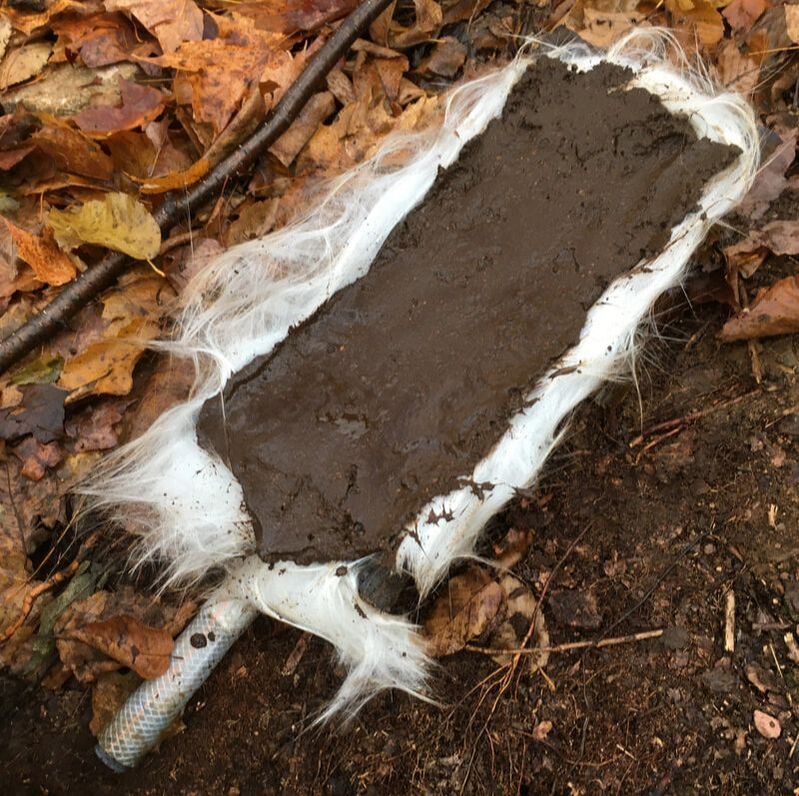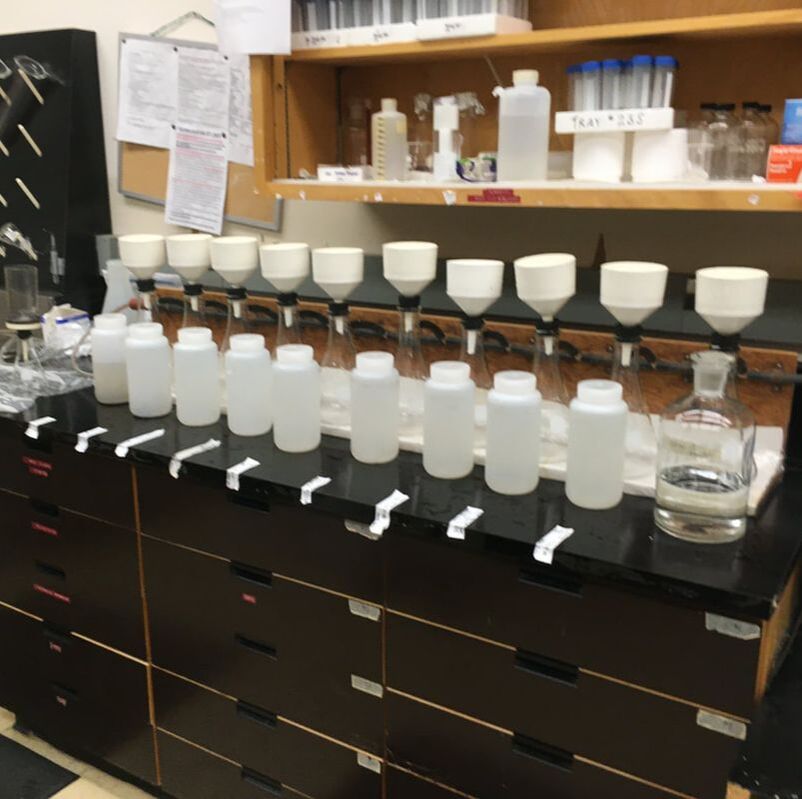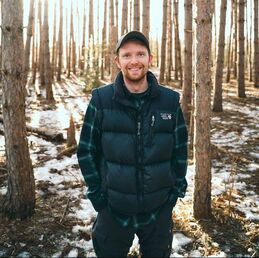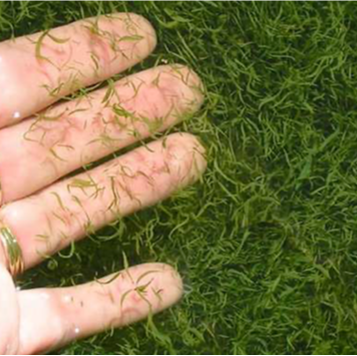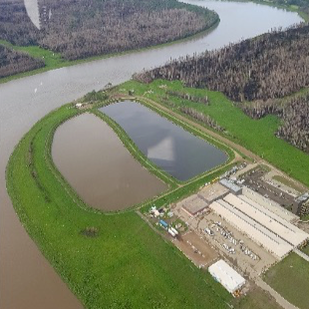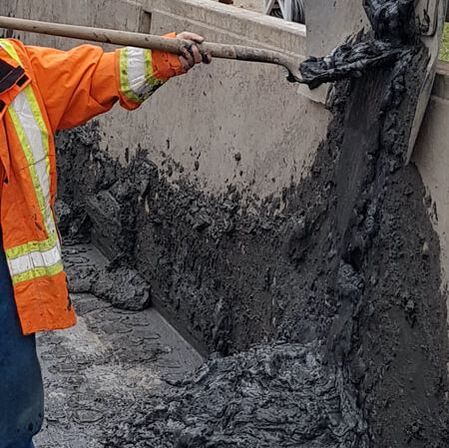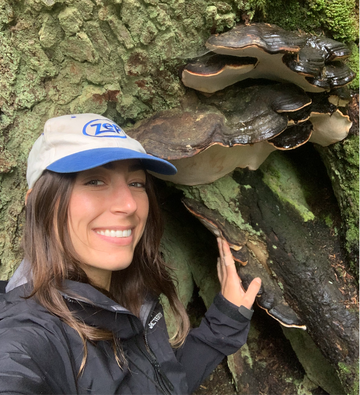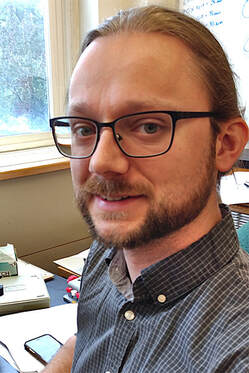Past Events
forWater Webinar: Friday February 3rd at 1-2pm ET
Hydrology is a key driver of water quality & treatability changes on Canada’s Pacific Coast
Alyssa Bourgeois, Master's Graduate, University of Alberta
Webinar description:
Despite the critical global importance of forested landscapes as sources of drinking water, few studies have examined the effects of forestry on water quality and treatability. Key questions that remain unanswered are:
Targeted water quality monitoring revealed that water quality and treatability exhibited greatest variation with storm and seasonal changes in hydrology across spatially distinct subwatersheds with various levels of disturbance by forest harvesting. This study suggests that temporal (i.e., hydrologic) factors predominated over spatial ones (i.e., forest harvest and catchment characteristics) in impacting water quality and treatability in this region.
Flow-driven changes in water quality and treatability were not significantly amplified by recent forest harvesting (≤35 years post-harvest); muted responses may be attributed to:
Despite the critical global importance of forested landscapes as sources of drinking water, few studies have examined the effects of forestry on water quality and treatability. Key questions that remain unanswered are:
- How does the magnitude of change caused by recent forest harvest (≤35 years post-harvest) compares to background spatiotemporal variation in water quality?
- What do those changes mean for drinking water treatability?
Targeted water quality monitoring revealed that water quality and treatability exhibited greatest variation with storm and seasonal changes in hydrology across spatially distinct subwatersheds with various levels of disturbance by forest harvesting. This study suggests that temporal (i.e., hydrologic) factors predominated over spatial ones (i.e., forest harvest and catchment characteristics) in impacting water quality and treatability in this region.
Flow-driven changes in water quality and treatability were not significantly amplified by recent forest harvesting (≤35 years post-harvest); muted responses may be attributed to:
- The prevalence of second growth forests (i.e., recent harvesting effects may be confounded by historical harvest in the early 1900s),
- Forestry practices (i.e., slash, a major source of organic matter, was burned after harvest), and
- Soils with low carbon storage (i.e., few organics were available for export).
|
Biography
Alyssa Bourgeois has several years of experience in academic, government and consulting roles working in the fields of aquatic ecology, biogeochemistry, and environmental flows. Her M.Sc. research through the University of Alberta examined spatiotemporal variation in water quality and treatability across a gradient of forest harvest on Vancouver Island. Since then, she has worked as an Environmental Flow Scientist at the Water Security Agency and Ecofish Research Ltd., evaluating water management and industry impacts on critical fish habitat. Throughout her career, Alyssa has led study design development, laboratory and field work, statistics and modelling, and reporting. Her expertise lies in data analysis, modelling, and scientific writing. |
forWater Webinar: Friday February 10th at 1-2pm ET
Legacy effects from forest harvesting on phosphorus transport dynamics
Evaluating changing source availability and source channel connectivity
Will Fines, Master's Candidate, University of Waterloo
Webinar description:
Forests are a critical water supply region globally, which are increasingly threatened by natural and anthropogenic disturbances. Climate exacerbated disturbances such as wildfires, are of particular concern as they alter hydrologic and biogeochemical cycles that increase the transport of sediment and associated nutrients, such as phosphorus, to stream networks. Forest harvesting has been proposed as a potential source water protection strategy that lessens fuel loads and reduces wildfire risks. However, this strategy needs to be adopted with caution as forest harvesting can also increase phosphorus transport to streams.
This study evaluates the immediate and legacy impacts of multiple forest harvesting strategies on phosphorus transport dynamics within hardwood dominated, Canadian Shield headwater catchments at the Turkey Lakes Watershed. Additionally, the physical processes (i.e., source channel connectivity and source availability) in a legacy clear-cut and control catchment were evaluated.
This webinar will discuss the study results that showed that harvesting significantly increased stream phosphorus concentrations, however these differences were often small and inconsequential in practice. This study also evaluated harvesting impact on source channel connectivity and phosphorus source availability showing limited impact. The approach used in this study shows how evaluating the physical processes that control water quality is useful for informing land management decisions that support source water protection.
Forests are a critical water supply region globally, which are increasingly threatened by natural and anthropogenic disturbances. Climate exacerbated disturbances such as wildfires, are of particular concern as they alter hydrologic and biogeochemical cycles that increase the transport of sediment and associated nutrients, such as phosphorus, to stream networks. Forest harvesting has been proposed as a potential source water protection strategy that lessens fuel loads and reduces wildfire risks. However, this strategy needs to be adopted with caution as forest harvesting can also increase phosphorus transport to streams.
This study evaluates the immediate and legacy impacts of multiple forest harvesting strategies on phosphorus transport dynamics within hardwood dominated, Canadian Shield headwater catchments at the Turkey Lakes Watershed. Additionally, the physical processes (i.e., source channel connectivity and source availability) in a legacy clear-cut and control catchment were evaluated.
This webinar will discuss the study results that showed that harvesting significantly increased stream phosphorus concentrations, however these differences were often small and inconsequential in practice. This study also evaluated harvesting impact on source channel connectivity and phosphorus source availability showing limited impact. The approach used in this study shows how evaluating the physical processes that control water quality is useful for informing land management decisions that support source water protection.
forWater Webinar
Friday November 25, 2022 at 12:00-1:00pm EST
Post-wildfire phosphorus dynamics in a drinking water reservoir & the efficacy of dredging as a management strategy to reduce internal phosphorus loading
Brittany Francescangeli, Master's Graduate, University of Waterloo
Webinar description
The frequency and severity of climate change-exacerbated wildfire disturbances are increasing worldwide and pose major challenges to drinking water treatment. Extreme wildfires significantly alter the hydrological cycle through the removal of vegetation cover and changes to soil properties. Collectively, this increases runoff production and sediment-phosphorus (P) yields downstream as fine sediment is the primary vector for P transport in aquatic ecosystems. The accumulation P-enriched sediment in lakes and reservoirs can cycle bioavailable P into the water course where it can become available and lead to the proliferation of algae and toxic cyanobacteria. The deterioration and fluctuation of water quality post-wildfire significantly challenges drinking water treatment and increases costs. Management strategies to mitigate internal P loading in lakes and reservoirs are being increasingly explored, however, to our knowledge this research is the first of its kind to examine the effects of wildfire of sediment-associated P dynamics and the long-term effectiveness of dredging to control internal P loading in drinking water reservoirs.
The goal of this research is to characterize the geochemical composition and abiotic controls of wildfire on particulate P forms and P mobility of fine-grained benthic sediment in two Alberta drinking supply reservoirs and to assess the efficacy of dredging as a strategy to control internal P loading. As our climate continues to warm, the risk of extreme wildfire is of increasing concern for water quality and supply. This research provides insight into post-wildfire P dynamics in a drinking water reservoir, the effectiveness of dredging as a long-term management strategy as well as a discussion on integrative management strategies, that encompass both watershed management and water supply infrastructure, to mitigate the impacts of wildfire on the provision of safe drinking water.
The frequency and severity of climate change-exacerbated wildfire disturbances are increasing worldwide and pose major challenges to drinking water treatment. Extreme wildfires significantly alter the hydrological cycle through the removal of vegetation cover and changes to soil properties. Collectively, this increases runoff production and sediment-phosphorus (P) yields downstream as fine sediment is the primary vector for P transport in aquatic ecosystems. The accumulation P-enriched sediment in lakes and reservoirs can cycle bioavailable P into the water course where it can become available and lead to the proliferation of algae and toxic cyanobacteria. The deterioration and fluctuation of water quality post-wildfire significantly challenges drinking water treatment and increases costs. Management strategies to mitigate internal P loading in lakes and reservoirs are being increasingly explored, however, to our knowledge this research is the first of its kind to examine the effects of wildfire of sediment-associated P dynamics and the long-term effectiveness of dredging to control internal P loading in drinking water reservoirs.
The goal of this research is to characterize the geochemical composition and abiotic controls of wildfire on particulate P forms and P mobility of fine-grained benthic sediment in two Alberta drinking supply reservoirs and to assess the efficacy of dredging as a strategy to control internal P loading. As our climate continues to warm, the risk of extreme wildfire is of increasing concern for water quality and supply. This research provides insight into post-wildfire P dynamics in a drinking water reservoir, the effectiveness of dredging as a long-term management strategy as well as a discussion on integrative management strategies, that encompass both watershed management and water supply infrastructure, to mitigate the impacts of wildfire on the provision of safe drinking water.
|
Biography
Brittany recently defended her MES thesis in the department of Geography and Environmental Management with the Water Institute at the University of Waterloo in Fall 2022. Her research is focused on the impact of wildfire the forms and mobility of particulate phosphorus (P) in a drinking water reservoir and the efficacy of dredging as a management strategy to reduce internal P loading. She received her BES from the University of Waterloo in Geography and Environmental Management with an Earth System Science specialization in 2019. Her previous work experience includes reforestation planting in Northern ON and Central AB, field technician and research assistant in Waterton National Park, AB, and scuba dive instructing on sailing yachts in Australia and New Zealand. |
forWater Webinar
Thursday December 1, 2022 at 12:00-1:00pm EST
Assessing wildfire risk to municipal drinking water using paleoecology
Nicholas Hebda, PhD Graduate, University of British Columbia
Webinar Description
Wildfire regimes are changing, with fires becoming more frequent and intense globally as climate change advances, putting natural capital such as surface water at risk. Wildfires can detrimentally impact surface water quality by burning vegetation and altering soils, leading to increased erosion and release of contaminants into waterways, including reservoirs. Here, a multi-proxy paleoecological investigation assesses the risk posed by wildfire to water supply in a municipal drinking water catchment serving 400,000 people in the Capital Regional District (CRD) on Vancouver Island, British Columbia, Canada.
Sediment records from Sooke Lake Reservoir and adjacent Begbie Lake were analyzed for charcoal, magnetic susceptibility, geochemistry, pollen, and diatoms to quantitatively reconstruct the terrestrial and aquatic biogeochemical impacts of five past fire events at sub-decadal resolutions. Severe fires have burned in the Sooke Watershed under differing climates, including modern conditions and past warmer, drier states. These past climates serve as analogues for anticipated future conditions. All five fires had statistically significant effects on terrestrial and aquatic systems in the study watershed across diverse physical, chemical, and biological fire-related proxy indicators. Magnetic susceptibility, sediment chemistry, and fossil diatom evidence reveal post-fire increases in soil erosion and water column turbidity. Sediment concentrations of potentially toxic elements, including barium, chromium, and lead, also increased after several fires. These fire-induced changes likely persisted for decades, in some cases perhaps for more than a century.
Overall, this study suggests that Sooke Lake Reservoir and Begbie Lake are vulnerable to post-fire effects which last for many years before pre-fire conditions return. Wildfires pose a significant threat to water quality and water supply security in the CRD. These insights into location-specific catchment fire characteristics and impacts inform evidence-based water supply management recommendations. The novel approach developed and demonstrated in this study can be applied to assess the wildfire risk to any surface water basin with a sufficiently long and intact sedimentary record.
Wildfire regimes are changing, with fires becoming more frequent and intense globally as climate change advances, putting natural capital such as surface water at risk. Wildfires can detrimentally impact surface water quality by burning vegetation and altering soils, leading to increased erosion and release of contaminants into waterways, including reservoirs. Here, a multi-proxy paleoecological investigation assesses the risk posed by wildfire to water supply in a municipal drinking water catchment serving 400,000 people in the Capital Regional District (CRD) on Vancouver Island, British Columbia, Canada.
Sediment records from Sooke Lake Reservoir and adjacent Begbie Lake were analyzed for charcoal, magnetic susceptibility, geochemistry, pollen, and diatoms to quantitatively reconstruct the terrestrial and aquatic biogeochemical impacts of five past fire events at sub-decadal resolutions. Severe fires have burned in the Sooke Watershed under differing climates, including modern conditions and past warmer, drier states. These past climates serve as analogues for anticipated future conditions. All five fires had statistically significant effects on terrestrial and aquatic systems in the study watershed across diverse physical, chemical, and biological fire-related proxy indicators. Magnetic susceptibility, sediment chemistry, and fossil diatom evidence reveal post-fire increases in soil erosion and water column turbidity. Sediment concentrations of potentially toxic elements, including barium, chromium, and lead, also increased after several fires. These fire-induced changes likely persisted for decades, in some cases perhaps for more than a century.
Overall, this study suggests that Sooke Lake Reservoir and Begbie Lake are vulnerable to post-fire effects which last for many years before pre-fire conditions return. Wildfires pose a significant threat to water quality and water supply security in the CRD. These insights into location-specific catchment fire characteristics and impacts inform evidence-based water supply management recommendations. The novel approach developed and demonstrated in this study can be applied to assess the wildfire risk to any surface water basin with a sufficiently long and intact sedimentary record.
|
Biography
Nicholas Hebda is a recent PhD graduate from the University of British Columbia Okanagan in Earth and Environmental Sciences. His doctoral research focuses on evaluating wildfire effects in the Sooke Watershed, a municipal drinking water catchment on southern Vancouver Island, using a novel paleoecological approach. Nicholas' results inform site-specific water source protection strategies, and his approach can be applied in other catchments to assess wildfire risk to drinking water. Previously, Nicholas worked extensively with the Canadian Forest Service, studying the relationships among climate, vegetation, and wildfire regimes. |

